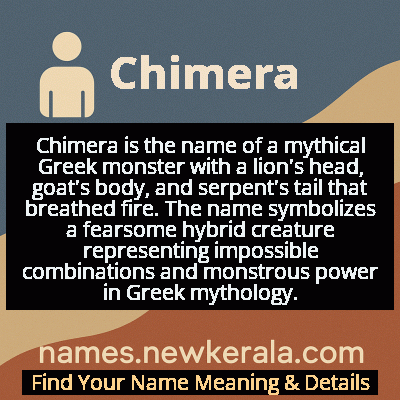Chimera Name Meaning & Details
Origin, Popularity, Numerology Analysis & Name Meaning of Chimera
Discover the origin, meaning, and cultural significance of the name CHIMERA. Delve into its historical roots and explore the lasting impact it has had on communities and traditions.
Name
Chimera
Gender
Male
Origin
Greek
Lucky Number
3
Meaning of the Name - Chimera
Chimera is the name of a mythical Greek monster with a lion's head, goat's body, and serpent's tail that breathed fire. The name symbolizes a fearsome hybrid creature representing impossible combinations and monstrous power in Greek mythology.
Chimera - Complete Numerology Analysis
Your Numerology Number
Based on Pythagorean Numerology System
Ruling Planet
Jupiter
Positive Nature
Optimistic, inspirational, and creative.
Negative Traits
Scattered, exaggerating.
Lucky Colours
Yellow, gold, purple.
Lucky Days
Thursday.
Lucky Stones
Yellow sapphire.
Harmony Numbers
1, 2, 9.
Best Suited Professions
Arts, writing, communication.
What People Like About You
Creativity, optimism.
Famous People Named Chimera
Chimera of Arezzo
Ancient Artisan
Created the famous bronze Chimera statue, masterpiece of Etruscan art
Chimera Johnson
Digital Artist
Internationally exhibited artist known for mythological surrealism
Chimera Petrakis
Mythology Scholar
Author of influential research on hybrid creatures in classical literature
Name Variations & International Equivalents
Click on blue names to explore their detailed meanings. Gray names with will be available soon.
Cultural & Historical Significance
The myth of Bellerophon slaying the Chimera while riding the winged horse Pegasus became one of classical antiquity's most enduring hero narratives. This story symbolized the triumph of human courage and divine favor over monstrous chaos, serving as both entertainment and moral instruction about hubris and the importance of maintaining natural order. The Chimera's image appeared extensively on ancient pottery, coins, and sculptures throughout the Mediterranean, influencing Etruscan and Roman art. Its cultural impact extended beyond Greece, becoming a universal symbol of impossible combinations and fantastic creatures that continues to resonate in modern literature, art, and psychology.
Extended Personality Analysis
Individuals named Chimera are typically perceived as possessing complex, multi-faceted personalities that blend seemingly contradictory qualities. They often demonstrate the lion's courage and leadership, the goat's persistence and practicality, and the serpent's wisdom and intuition—creating a personality that is both formidable and deeply creative. This name suggests someone who thrives on synthesizing diverse elements, whether in their thinking, relationships, or professional pursuits. They may be natural innovators who excel at combining different fields or ideas in novel ways, much like the mythological creature that combined multiple animal forms.
Those bearing this name often exhibit intense passion for their interests (reflecting the Chimera's fire-breathing nature) coupled with strategic adaptability. They might struggle with integrating their diverse qualities into a cohesive identity, occasionally feeling pulled in different directions by their various strengths and interests. However, this very complexity often makes them remarkably resilient and capable of approaching challenges from multiple perspectives. Their personality tends to be both imaginative and grounded, visionary and practical—making them effective at turning abstract ideas into concrete reality. The name implies someone who defies simple categorization and whose true depth reveals itself gradually over time.
Modern Usage & Popularity
In contemporary naming practices, Chimera remains an exceptionally rare choice, primarily selected by parents drawn to powerful mythological names with dramatic resonance. Its usage is almost exclusively masculine when employed as a personal name, though the term has broader gender-neutral applications in scientific and popular contexts. The name finds occasional use in artistic, academic, and counter-cultural circles where its mythological weight and uniqueness are valued over traditional naming conventions. While it doesn't appear on standard baby name charts due to its extreme rarity, Chimera has gained some traction within fantasy literature communities, classical studies enthusiasts, and among those seeking names that challenge conventional boundaries. Its modern usage reflects a growing interest in names that carry deep symbolic meaning and mythological power rather than following mainstream trends, appealing particularly to parents interested in Greek mythology, literature, or unconventional identities.
Symbolic & Spiritual Meanings
Symbolically, Chimera represents the profound concepts of hybridity, impossibility, and the creative fusion of disparate elements. It has evolved from its mythological origins to become a universal metaphor for any fantastical idea or seemingly impossible dream—something imaginative but ultimately unreal. In scientific contexts, the term describes biological chimeras, organisms containing genetically distinct cell populations, thus extending the mythological concept into tangible reality. The name carries powerful connotations of innovation through unexpected combination, suggesting the creation of something entirely new and unprecedented by merging existing elements in novel ways. It represents the delicate boundary between possible and impossible, natural and unnatural, serving as a compelling metaphor for human creativity, technological synthesis, cultural blending, and the transformative power of imagination in overcoming apparent contradictions.

